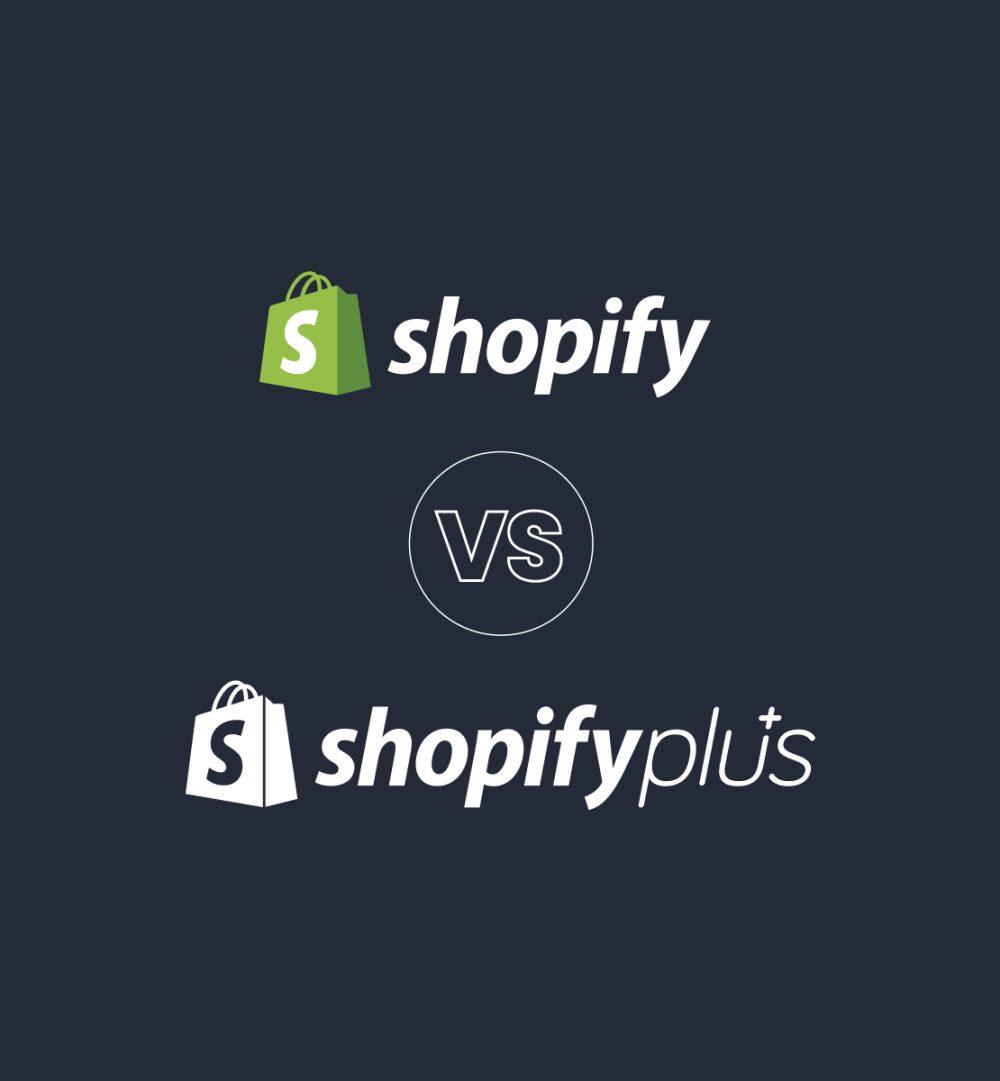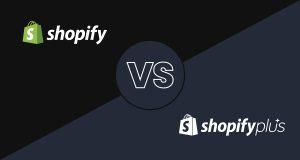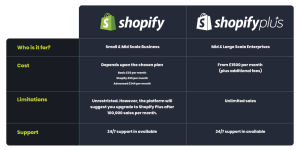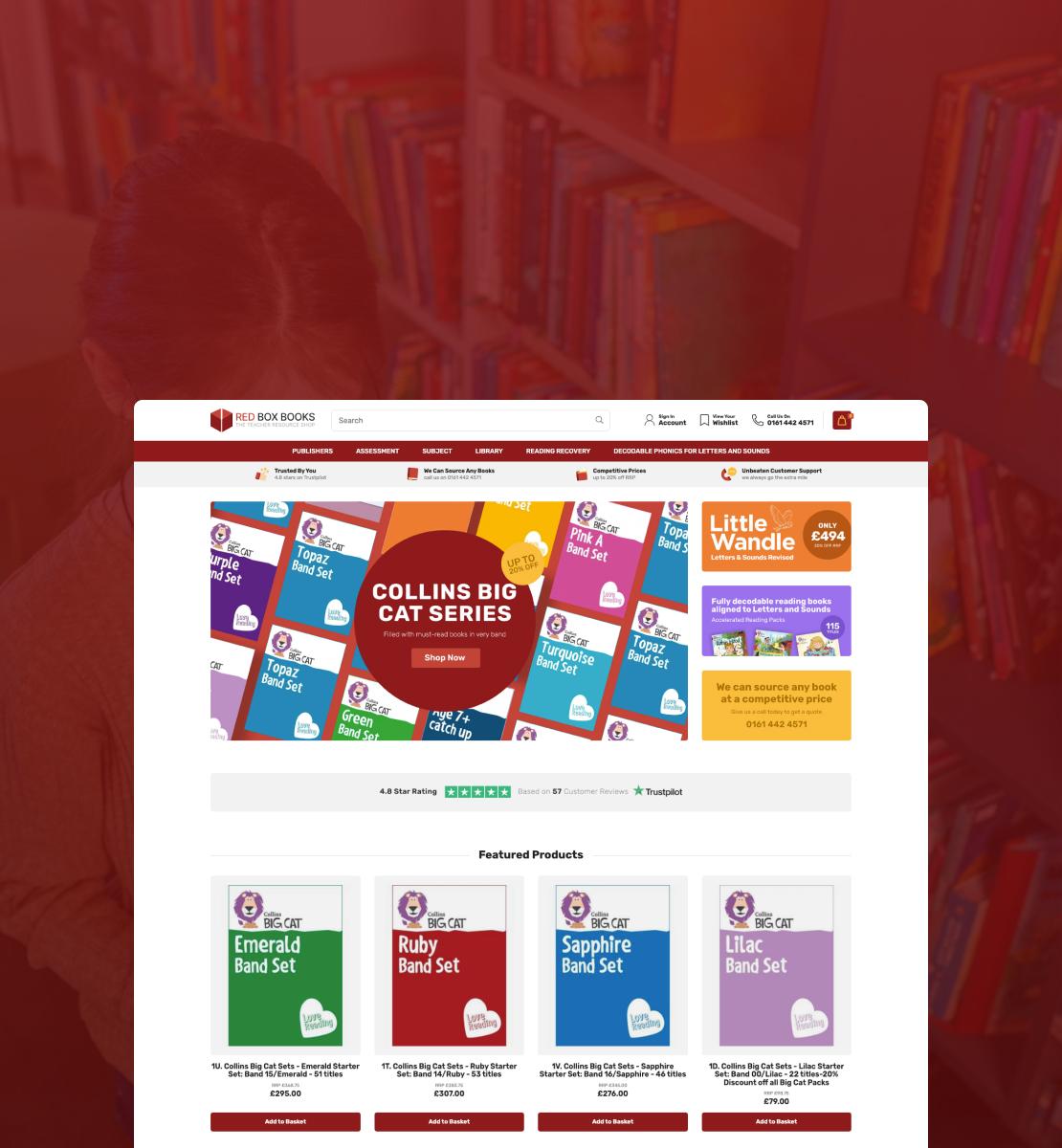When it comes to launching your ecommerce store, it can be tricky to know what platform best suits your needs.
With so many ecommerce platforms to choose from, many brands are turning to Shopify thanks to its seamless usability and extensive range of advanced features. As one of the most popular ecommerce platforms around, you may be wondering what all of the fuss is about. We’re here to identify the key advantages and disadvantages of Shopify and Shopify Plus so you can make an informed decision about which platform will best suit your business.
Shopify Vs Shopify Plus
The Key Differences
Shopify and Shopify Plus are both excellent ecommerce platforms that are proven to drive lucrative results for brands across the globe. However, many business owners, ecommerce managers and marketers don’t truly understand the differences between the two offerings. Put simply, Shopify is a user-friendly, conversion-focused ecommerce platform that is fantastic for small, medium and steadily-growing businesses. Shopify Plus is a much more advanced version that allows well-established brands and large enterprises to utilise its advanced capabilities and superior functionality to drive rapid growth and create exceptional customer experiences. We’ve broken down the key differences of the platforms to help you make an informed decision for your business:
Scalability:
Shopify: Great for small and medium sized businesses who have steady traffic. For brands who have sharp influxes of high-traffic, careful planning is needed to ensure the Shopify store continues to operate without a glitch.
Shopify Plus: Easily handles large volumes of traffic whilst retaining stability and integrity. Perfect for large enterprises who run time-limited offers or brands who create a buzz on social media before dropping new collections.
Flexibility:
Shopify: Offers a vast range of customisable themes and third-party integrations to extend the platform’s capabilities and functionality. There are limitations to what Shopify can do, particularly in terms of the checkout process.
Shopify Plus: Provides brands with the ability to have full control over the design and functionality of their site. A fully-customisable checkout, personalised shopping experiences and unlimited staff accounts are some of the key advantages.
Features:
Shopify: Offers a wide range of features so you can easily run your ecommerce business including integrated payment processing, a secure checkout, cross-selling tools, built-in marketing tools and basic analytics.
Shopify Plus: An extensive range of advanced features are available for ecommerce brands including advanced integration capabilities, in-depth analytics and apps such as Script Editor which allows for personalised checkout experiences.
Integrations:
Shopify: Has an extensive catalogue of third-party plugins within its app store to extend the capabilities of your Shopify store.
Shopify Plus: Priority access to new apps, features and technologies to help brands grow. Additionally, Shopify Plus can handle extremely complex integrations that large businesses require.
Suitability:
Shopify: Standard Shopify is suitable for small and medium businesses who want a fast, beautiful and highly-functional website but don’t need complex integrations or advanced features to fully customise their online presence. Great for start-ups, independent businesses and small/medium retailers who don’t often experience huge surges in traffic.
Shopify Plus: Great for large businesses and enterprises turning over >$1million annually, brands who need over 15 members of staff to have access to their account, those that need to create customisable rules (e.g. shipping, payments etc.), B2B traders and brands who sell internationally and need a multilingual site.
Support:
Shopify: Has a vibrant community of expert developers, a dedicated online support hub with a live chat functionality,
Shopify Plus: Access to priority 24/7 technical support from leading experts, access to the Shopify Plus Academy for training on how to grow your business and more.
Shopify Vs Shopify Plus
How To Decide Between Shopify & Shopify Plus
Now you know the key differences between Shopify and Shopify Plus, you probably have a deeper understanding of which will be more suitable for your business. But if you’re still not sure whether Shopify Plus is right for you, it’s time to ask yourself these questions:
- Do you turnover more than £1million per annum?
- Do you need over 15 members of staff to have access to your account?
- Do you sell wholesale? (or want to?)
- Do you want to automate sales and offers in advance?
- Do you need a fully-customised checkout?
- Are you ready to take it international?
If you answer yes to the majority of these questions, it’s likely that you’ll need to invest in a Shopify Plus ecommerce store that can handle complex integrations, large surges in traffic, international sales and provide you with the most efficient back-end processes. However if all of the above are feeling slightly overwhelming, perhaps you can stick with good old Shopify for the time being. If you change your mind later down the line, we’re always on hand to help you replatform your site and migrate your existing content with ease.
Shopify Vs Shopify Plus
FAQs
Shopify Plus is specifically designed to support large businesses who are selling large volumes online, often receive high surges of traffic and have complex needs. Smaller businesses with more simple needs may find that standard Shopify plans are sufficient.
Yes. Shopify Plus users generally have lower transaction fees than those on regular plans. However, transaction fee structure vary for different payment gateways so be sure to conduct your own research or ask a a web expert to ensure you choose the most suitable payment options for your brand.
Yes, migrating from Shopify to Shopify Plus is possible. However, any migration involves careful planning, coordination and is a very intricate process. We always recommend working with Shopify Plus and web design experts to ensure a smooth transition.
Shopify Plus is geared towards enterprise-level businesses who require customised solutions and therefore, the price reflects this. Shopify Plus pricing is typically higher that regular Shopify plans but depending on your budget, there will be a Shopify plan to suit your business.
While both platforms offer a great level of storefront customisation, Shopify Plus offers more flexibility for customisation thanks to the platforms APIs and scripting capabilities.
Yes, both plans provide POS solutions for in-store retail where brands can sync their online and offline sales data for centralised stock management.
In short, yes. Shopify and Shopify Plus have different limits of the number of products and variations a store can have, with Shopify Plus offering higher limits for businesses with extensive product catalogs.
Shopify Plus is designed to handle large influxes of traffic such as those that occur during Black Friday offers. Its dedicated infrastructure and priority support ensure smooth operations during high-traffic events.
Shopify Plus is designed to handle high-traffic events, and it offers features like dedicated infrastructure, automatic scaling, and priority support to ensure smooth operations during peak sales periods.
Yes, this is a standard feature available across all plans.
Yes, both platforms support a range of third-party payment gateways so you can choose the right one for your business.
If you’re still unsure about which platform is right for you, don’t hesitate to get in touch or take our Free Replatforming Audit if you’re already running an ecommerce website and considering making the switch over to Shopify!











